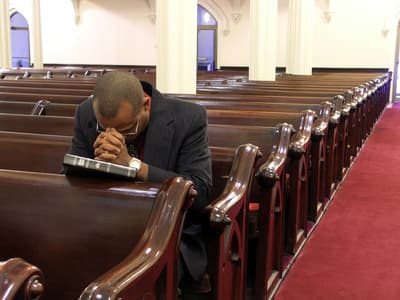Job and His Friend Zophar
The dialogue of Job with his friends shows that instead of being his comforters, Job’s friends were heartless and cruel to him. At the end of his dialogue with Bildad, Job pleaded with his friends, “Have pity on me, have pity on me, O you my friends” (Job 19:21). The reason Job asked his friends to show compassion was because, as Job said, “the hand of God has touched me” (Job 19:21).
Job’s friends were shocked with Job’s accusations. They believed that Job was suffering because he was a sinner. The hand of God had touched him because he was speaking against God. Job’s friends believed that Job did not deserve pity from them. They believed that Job should be condemned for criticizing God. In their dialogue with Job, Job’s friends were the defenders of God.
Zophar was the last of Job’s friends to speak. While Eliphaz and Bildad spoke three times, Zophar only spoke twice. Zophar joins his two companions in severely criticizing Job for his behavior.
The First Dialogue Between Zophar and Job
A. Zophar’s First Speech
Zophar is horrified by the blasphemies he heard Job speak: “Shouldn’t someone answer this multitude of words? Is a person proved innocent just by a lot of talking? Should I remain silent while you babble on? When you mock God, shouldn’t someone make you ashamed? You claim, ‘My beliefs are pure,’ and ‘I am clean in the sight of God.’ If only God would speak; if only he would tell you what he thinks” (Job 11:2–5 NLT).
In his dialogue with Job, Zophar uses Job’s own words to criticize him. Zophar uses the words Job spoke to defend himself and then hurls them back in Job’s face. Zophar said to Job, “Listen! God is doubtless punishing you far less than you deserve” (Job 11:6 NLT). Zophar believes that God could have been even harsher with Job if God would impose the full punishment that Job deserved.
Zophar urges Job to stretch out his hand and pray to God, “If only you would prepare your heart and lift up your hands to him in prayer” (Job 11:13 NLT). Job should pray and ask God to forgive his sins, “Get rid of your sins, and leave all iniquity behind you” (Job 11:14 NLT).
Zophar believes that the only way to prove that Job was innocent was by Job cleansing himself of his iniquity. If Job would pray and confess his sins, “then your face will brighten with innocence. You will be strong and free of fear. You will forget your misery [and] your life will be brighter than the noonday” (Job 11:15–17 NLT).
B. Job’s Response to Zophar
In his response to Zophar, Job uses fake praise to insult Zophar, “You people really know everything, don’t you? And when you die, wisdom will die with you! Well, I know a few things myself – and you’re no better than I am” (Job 12:2–3 NLT).
Job speaks about the injustice of his situation. Even though he is innocent, he has become the laughing stock to people around him. He is a righteous man and is suffering, but “robbers are left in peace, and those who provoke God live in safety” (Job 12:6 NLT).
Job believes that God is responsible for this injustice, “Just ask the animals, ask the birds of the sky, let the fish in the sea speak to you, and they will tell you. For they all know that my disaster has come from the hand of the LORD” (Job 12:7–9 NLT).
Job speaks about the actions of God (Job 12:11–25) in which he says that there is no way of understanding how God acts. Job believes that divine behavior defies human logic. Job’s words are a veiled criticism of God. To Job, God is neither wise nor just.
Job tells Zophar that he wants to take his case to a higher court, “As for me, I would speak directly to the Almighty. I want to argue my case with God himself” (Job 13:3 NLT). Once again, Job criticizes his friends, “As for you, you smear me with lies. As physicians, you are worthless quacks. If only you could be silent! That’s the wisest thing you could do” (Job 13:4–5 NLT).
Job accuses his friends of defending God with lies. In the end, they will be rebuked for their false words, “Are you defending God with lies? Do you make your dishonest arguments for his sake? Will you slant your testimony in his favor? Will you argue God’s case for him? What will happen when he finds out what you are doing? Can you fool him as easily as you fool people? No, you will be in trouble with him if you secretly slant your testimony in his favor” (Job 13:7–10 NLT).
Job tells his friend to be silent so that he may confront God and present his case before him, “Be silent now and leave me alone. Let me speak, and I will face the consequences. Yes, I will take my life in my hands and say what I really think. God might kill me, but I have no other hope. I am going to argue my case with him. But this is what will save me – I am not godless. If I were, I could not stand before him” (Job 13:13–16 NLT).
Job knows the risk of coming before God. He may die when he sees God, but one thing assures him that he will live after confronting God with his case, he is not a sinner. If Job were a sinner as his friends are accusing him to be, Job would not be able to stand before God.
When Job comes before God, he will present his case, “Listen closely to what I am about to say. Hear me out” (Job 13:17 NLT). But before Job presents his case, he makes two requests of God. First, Job asks God, “Remove your heavy hand from me” (Job 13:21 NLT). Job wants God to release him so that he can speak freely. Second, Job asks God, “don’t terrify me with your awesome presence” (Job 13:21 NLT). Job needs courage and assurance when coming before God.
Free to present his case to God, Job asks, “Tell me, what have I done wrong? Show me my rebellion and my sin. Why do you turn away from me? Why do you treat me as your enemy?” (Job 13:23-24 NLT). Job claims that God is punishing him unfairly and he wants to know the reason for his suffering.
The Second Dialogue Between Zophar and Job
A. Zophar’s Second Speech
Zophar begins his second speech by saying how offended he is by Job’s words, “I must reply because I am greatly disturbed. I’ve had to endure your insults, but now my spirit prompts me to reply” (Job 20:2–3 NLT).
Zophar uses Job’s own words to attack him and to accuse him of being a sinner before God. Zophar speaks about the fate of the wicked, “They will fade like a dream and not be found. They will vanish like a vision in the night” (Job 20:8 NLT). Here Zophar is using against Job the same words for “dream” and “vision” that Job mentioned in chapter 7:14.
Job said, “The eye that now sees me will see me no longer; you will look for me, but I will be no more” (Job 7:8 NIV). Job is saying that the God who in the past looked after him will no longer see him anymore. Zophar said to Job, “The eye that saw [the wicked] will not see him again; his place will look on him no more” (Job 20:9 NIV). Zophar is mocking Job by saying that God will see him no more because he is a wicked person.
Job believed that his redeemer would stand on the dust on his behalf (Job 19:25). Zophar mocks Job by saying that the bodies of the wicked “will lie down in the dust” (Job 20:11). Zophar is saying that Job does not have a redeemer because he is a wicked man.
In his response to Eliphaz, Job said, “O earth, do not cover my blood; let my outcry find no resting place. Even now, in fact, my witness is in heaven” (Job 16:18–19). Zophar uses Job’s words, reverses their meaning, and declares that Job is like the wicked. Zophar said, “The heavens will reveal their iniquity, and the earth will rise up against them” (Job 20:27).
Although Zophar is speaking about the wicked in particular, his words are addressed to Job. Zophar believes that Job has lost everything and is suffering because he is a wicked man who deserves to be rejected by society and to be punished by God. Zophar closes his dialogue with Job by describing the fate of the wicked: “The flood shall sweep away his house with the waters that run off in the day of God’s anger. This is the portion of a wicked man, and the heritage appointed him by God” (Job 20:28–29). In Zophar’s mind, this is what has happened to Job.
B. Job’s Response to Zophar
In his response to Zophar, Job shows his irritation with his friends, but he says that his grievance is not with them, but with God, “Listen closely to what I am saying. After I have spoken, you may resume mocking me. My complaint is with God, not with people” (Job 21:2–4 NLT).
Job disputes Zophar’s assertion that the wicked are punished by God. Job says that evil people seem to be the recipients of God’s blessings, “Why do the wicked prosper, growing old and powerful? They live to see their children grow up and settle down, and they enjoy their grandchildren. Their homes are safe from every fear, and God does not punish them” (Job 21:7–9 NLT).
Job tells Zophar how wrong he is about the fate of the wicked, “Look, I know what you’re thinking. I know the schemes you plot against me. You will tell me of rich and wicked people whose houses have vanished because of their sins. But ask those who have been around, and they will tell you the truth. Evil people are spared in times of calamity and are allowed to escape disaster” (Job 21:27–30 NLT).
Job’s Final Defense of His Integrity
In Chapters 29–31, Job presents a defense of his integrity by mentioning the happy days he lived before his calamity began. Job said, “I long for the years gone by when God took care of me, when he lit up the way before me and I walked safely through the darkness. When I was in my prime, God’s friendship was felt in my home. The Almighty was still with me, and my children were around me” (Job 29:2–5 NLT).
Then Job addresses God, wanting to know why his prayers have not been answered, “I cry to you, O God, but you don’t answer. I stand before you, but you don’t even look. You have become cruel toward me. You use your power to persecute me” (Job 30:20–21 NLT).
In Chapter 31, Job affirms that he has been a moral man whose life has been one that avoids evil, “I made a covenant with my eyes not to look with lust at a young woman” (Job 31:1 NLT). “Let God weigh me on the scales of justice, for he knows my integrity” (Job 31:6 NLT). Job presents a list of sins that would deserve God’s punishment, but Job says that he did not commit any of these sins. Job maintains his innocence and affirms that he has not done anything to deserve his afflictions.
Conclusion
In his dialogue with Job, Zophar attacks Job’s integrity and his blasphemous words against God. Zophar said that Job was a sinner who had sinned against God and for this reason, he fully deserved the calamities that came upon him and his family. He also deserved to be rejected and abandoned by God because of his evil actions. Job would not find a redeemer to advocate his case because God does not grant the requests of the wicked.
Job derides Zophar’s accusations by mounting a strong defense of his integrity. Job lists a litany of possible sins that could bring divine judgment upon him, but he strongly denies committing these sins. Job once again says that he has lived a life above reproach and that he has done nothing to deserve the severe punishment of God.
For all nine lessons on this series, visit my post on Studies on the Book of Job.
NOTE: For other studies on the Book of Job and the problem of suffering, read my post, An Introduction to the Book of Job.
Next: LESSON 6
“Elihu, The Passerby”
Job, Chapters 32–37
Claude Mariottini
Emeritus Professor of Old Testament
Northern Baptist Seminary
NOTE: Did you like this post? Do you think other people would like to read this post? Be sure to share this post on Facebook and share a link on Twitter or Tumblr so that others may enjoy reading it too!
I would love to hear from you! Let me know what you thought of this post by leaving a comment below. Be sure to like my page on Facebook, follow me on Twitter, follow me on Tumblr, Facebook, and subscribe to my blog to receive each post by email.
If you are looking for other series of studies on the Old Testament, visit the Archive section and you will find many studies that deal with a variety of topics.





